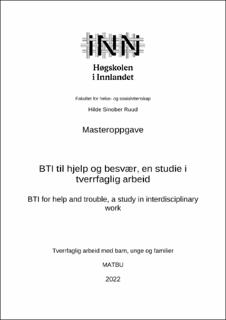BTI til hjelp og besvær, en studie i tverrfaglig arbeid
Master thesis
Permanent lenke
https://hdl.handle.net/11250/3059614Utgivelsesdato
2022Metadata
Vis full innførselSamlinger
Sammendrag
SammendragTittel:BTI til hjelp og besvær, en studie i tverrfaglig arbeid.
Problemstilling:På hvilken måte oppleves BTI som et nyttig verktøy for tverrfaglig samarbeid?
Denne masteroppgaven er en kvalitativ studie i barnehageledere og PPT-rådgiveres opplevelse av samhandlingsmodellen BTI. Den er forankret i teori om tidlig innsats, Bronfenbrenners utviklingsøkologiske modell, systemteori og implementeringsteori.
Problemsstillingen er undersøkt gjennom 5 kvalitative intervjuer og tematisk analyse av de transkriberte intervjuene. Resultatene kan oppsummeres fem hovedfunn:• Informantene opplever at det er fokus på samhandling og samarbeid med andre enheter, bekymringer for kommunes barn skal løses sammen. Det er lov å be om hjelp fra andre enheter.• Det snakkes mer med barn enn tidligere, foreldresamarbeidet har blitt bedre og barn får tidligere hjelp enn de gjorde før.• Modellens ene verktøy, stafettloggen er ikke tatt i bruk, og oppleves vanskelig tilgjengelig og upraktisk, mens de er positive til modellens andre verktøy handlingsveilederen som benyttes.• Det er ikke kjent for informanten at kommunen har en opplæringsplan for alle kommunes ansatte. Informantene opplever at det mangler oppfriskning i modellen og en videre plan for opplæring i modellen for alle ansatte.• Informantene oppleves positive til modellen selv om de opplever at den ikke er fullt implementert.Det er mye positivt med samarbeid og samhandling, men at det ikke alltid er like lett i praksis. Modellen fører til at de er «raskt på» med å ta opp uro og bekymring, og at dette fører til at barna får tidligere hjelp enn de ville ha gjort tidligere. Informantene gir uttrykk for positiv holdning til modellen og ønsker å jobbe etter denne for at barn og familier skal få hjelp og at en unngår skjevutvikling. Arbeidet deres begrenses av ressurser, kompetanse og manglede faglig påfyll, og andre å støtte seg til når det er flere barn en er bekymret for. AbstractTitleBTI for help and trouble, a study in interdisciplinary work.
Main reach questionIn what way is BTI perceived as a useful tool for interdisciplinary collaboration?
This master is a qualitative study of kindergarten leaders and PPT advisors experience with the collaboration of the interdisciplinary model BTI. The study is rooted in theory of early intervention, Bronfenbrenners, development ecology model, system theory and theory of implementation.
The main reach question has been examined through five qualitative interviews and thematic analysis of the transcribed interviews. The result illustrates in five main findings:• The informants experience focuses on interaction and collaboration with other units, and concern for the children in the municipality should be resolved together. It is allowed to ask for help from other units.• Children are spoken to more than before; parental cooperation has improved, and children receive help earlier than they did before.• The models one tool, the relay log, has not been used, and is perceived as difficult to access and impractical. While they are positive about the other tool “action guide” that is used.• It is not known to the informants that the municipality has a training plan for all the municipality’s employees. The informants experience lack of updating in the model and a further plan for training for all employees.• The informants feel positive about the model even if they feel that it has not been fully implemented.
There is much positive about cooperation and interaction, but it is not always so easy in practice. The model means that they are quick to address anxiety and concern, and it leads to earlier help for the children than before. The informants express a positive attitude towards the model and want to work according to it, so that children and families can get help to avoid skewed development. Their work is limited by recourse, competence and the lack of professional replenishment, and others to seek support when there are several children one is concerned about.
